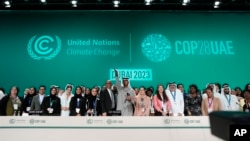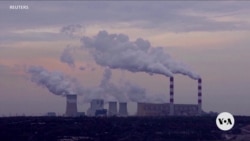The world’s largest climate conference, COP28 in Dubai, closed with a historic deal to transition away from fossil fuels, but some experts and activists call the agreed text “weak.”
After two weeks of intense negotiations and the hope for a phase-out of fossil fuels, countries agreed only on a “phase-down of unabated coal power” and “phasing out [of] inefficient fossil fuel subsidies.” They also gave a nod to the role of “transitional fuels” in reducing carbon emissions. This comes after a Saudi-led opposition to any reference of fossil fuels in the deal.
Video report by Henry Ridgwell
U.S. climate envoy John Kerry said the role of the so-called transitional fuels — like regular oil and gas — should be limited and temporary.
But the nearly 200 countries gave a greenlight to tripling global renewable energy capacity and doubling energy efficiency by 2030 after a hard push from the G20.
This follows the first-ever Global Stocktake report released in September, which revealed that nations are far from reaching the Paris Agreement goal of limiting global temperature rise to 1.5 degrees Celsius above pre-industrial levels.
To do that, the report said, nations will have to reduce greenhouse gas emissions by 43% by 2030.
EU Commissioner for Climate Action Wopke Hoekstra applauded the deal to “set in motion an irreversible, accelerated transition away from fossil fuels,” but Li Shuo, director of the China Climate Hub at the Asia Society Policy Institute said the overall language on coal, the dirtiest fossil fuel, remains weak.
“In light of the intensifying climate impact, uniting divergent national interests for decisive climate response remains a daunting task,” Shuo told VOA.
The text on phasing down on unabated coal hasn’t changed much from the agreement reached at COP26 Glasgow. Yan Qin, carbon analyst from data provider Refinitiv, also agreed that the wording is weak.
“It is still a win for this COP, making history by putting the world on track to phase out fossil fuels. However, the wording throughout is weak, despite that it is stronger than the previous version [at COP27]…this is mainly signaling a start that governments will work on to transition away from fossil fuels, but just a start,” Qin told VOA.
For the biggest coal producer and consumer, China, the impacts are likely minimal, Qin added. Coal accounts for over half of the country’s energy mix, but Beijing is still greenlighting the construction of two new coal-fired power plants each week since last year. Officials said it’s to ensure energy security, while President Xi Jinping also promised to phase down coal from 2026.
Romain Loualalen, global policy lead of NGO Oil Change International, said in a statement that the text now “risks giving big polluters a free pass to continue extraction at a time when swift and coordinated action is desperately needed.”
COP28 has been filled with controversies: a BBC report alleged President Sultan al-Jaber, the owner of an oil company, was using his position to draw up fossil fuel deals with different countries before the conference kicked off. A few days into it, he came under fire again for saying there’s “no science” behind the phase-out of fossil fuel to achieve the Paris Agreement goal, according to a Guardian report.
A day after that, an analysis from the Kick Big Polluters Out coalition showed a record number of nearly 2,500 fossil fuel lobbyists had joined COP28.
Global South activists aren’t happy with the deal either. The alliance of small island nations or AOSIS, which represents many countries vulnerable to rising sea levels, pointed out “a litany of loopholes” in the deal and called it “a step backward.”
Some climate justice advocates lambasted the deal, saying that the developed countries — often historic emitters — are not providing developing countries with enough financing for energy transition and climate adaptation. Mohamed Adow, director of the energy and climate think tank Power Shift Asia, said there needs to be “greater expectation on rich fossil fuel producers to phase out first.”
The biggest historic emitter and major oil producer, the United States, for example, pledged only $24.5 million to the newly approved loss and damage fund meant to compensate for the climate impact felt by vulnerable countries in the Global South. The EU and the UAE led the effort to raise over $700 million for the fund; the Green Climate Fund also received historic pledges of a total of $12.8 billion from 31 countries while an Adaptation Fund bagged $1.3 billion from 26 countries.
This amount, however, is well short of the promised annual $100 billion from wealthy nations to their vulnerable counterparts and the estimated yearly $2.5 trillion they actually need.
“This will make it harder for countries in Asia to make the transition from fossil fuels to renewable energy with safeguards for vulnerable communities,” Nithi Nesadurai, regional director of Climate Action Network Southeast Asia, told VOA.







